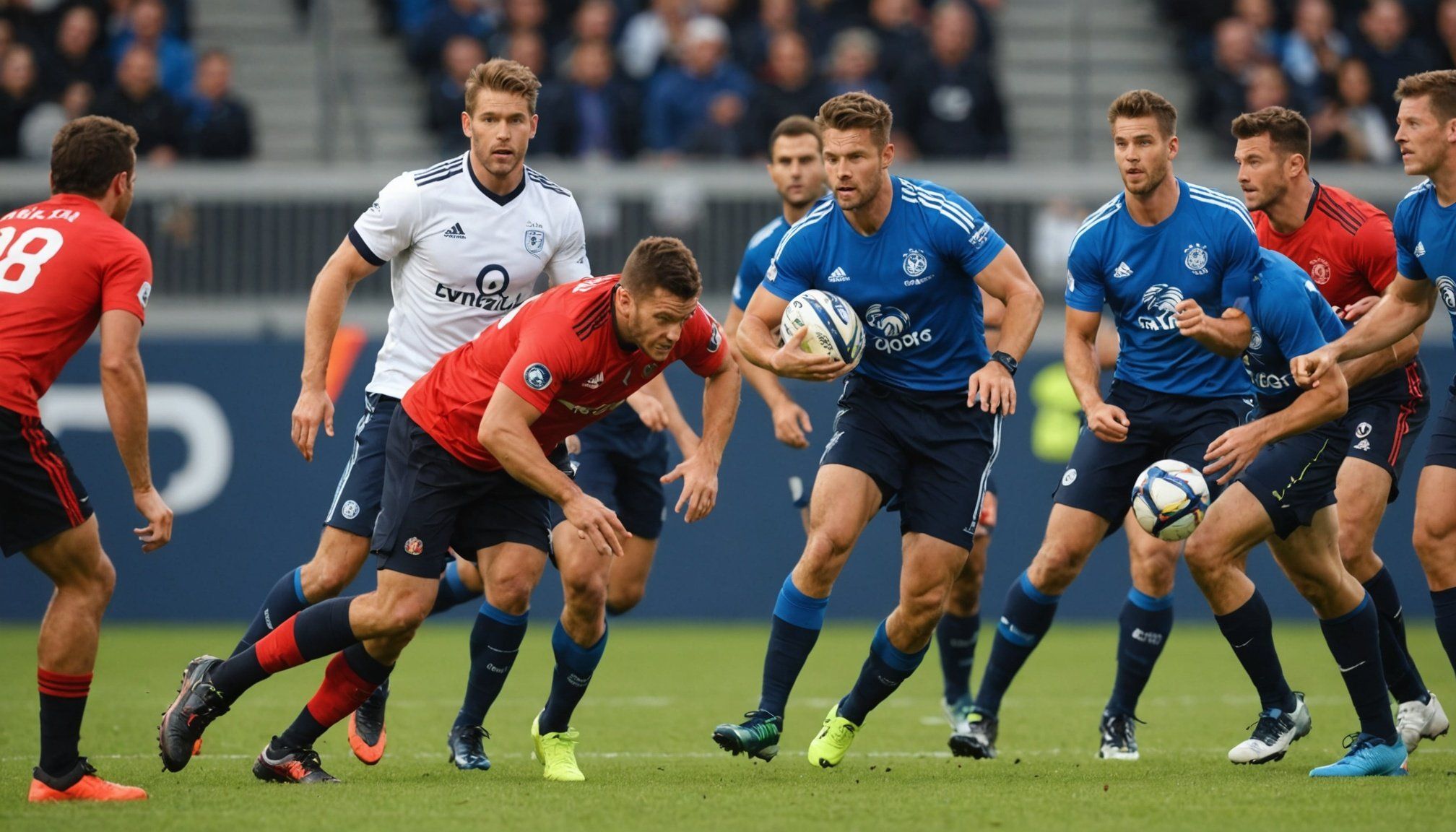Practical Strategies for Implementing Sports Psychology in Teams
Incorporating sports psychology into team dynamics can significantly boost performance and efficiency. Here are practical strategies to achieve this:
Setting up Team-Building Exercises
The use of effective team-building exercises is paramount. Such activities are designed to align with core sports psychology principles, fostering trust and understanding. For instance, strategic games like problem-solving challenges immerse team members in situations that require cooperation and communication. This not only strengthens the collaborative environment but also translates directly into workplace synergy by encouraging teamwork and enhancing interpersonal connections.
Also to see : Supercharge Your Cycling Skills: Top Off-Season Training Strategies for Competitive Riders
Developing Communication Strategies
Open dialogue is vital. Emphasizing open and honest communication helps create a feedback-rich culture, where everyone feels valued and heard. Techniques such as active listening sessions promote empathy, allowing team members to better understand one another. Such strategies underscore the importance of communication in bolstering team spirit and resolving conflicts effectively.
Fostering a Positive Team Culture
Defining clear team roles and expectations is key. By promoting a positive team culture rooted in trust-building, organizations can encourage collaboration. Recognizing and celebrating team achievements further consolidates this environment, enhancing motivation and strengthening the bonds within the team.
Also to discover : Decoding Athlete Mentalities: Unique Psychological Strategies in Solo vs. Team Sports
By implementing these actionable strategies, teams can harness the power of sports psychology to achieve heightened levels of collaboration and success.
Introduction to Sports Psychology in Team Collaboration
Sports Psychology plays a crucial role in enhancing team collaboration by applying its principles to workplace dynamics. It primarily focuses on understanding the psychological factors that influence performance and how they can be utilized to improve team interactions. By integrating these principles, organisations can foster a workplace synergy that is both efficient and harmonious.
At its core, sports psychology examines the mental and emotional aspects of physical performance. It involves studying how psychological factors affect participation and outcomes in sports and exercise, and subsequently devising strategies to leverage these factors to boost team collaboration.
In the workplace, synergy relies heavily on teamwork. Effective collaboration is critical to achieving organizational goals. Incorporating sports psychology into team settings aligns personal and group objectives, leading to improved performance and satisfaction. Teams that work well together can benefit from enhanced communication, trust, and a shared vision.
By adopting sports psychology techniques, organisations empower their teams to surpass challenges, build resilience, and maintain high morale. This requires setting collective goals and cultivating an environment where everyone feels supported in achieving both individual and team aspirations. Adopting these strategies leads to a robust and motivated workforce ready to take on new challenges.
Key Sports Psychology Concepts for Enhanced Teamwork
In the realm of team dynamics, understanding the underlying psychology is pivotal for fostering effective collaboration. Central to this is acknowledging the role of motivation. A motivated team exhibits heightened morale, driving members to achieve shared objectives. As motivation dwindles, team spirit and performance often follow suit. Recognising this, leaders should continuously cultivate an environment that nurtures intrinsic motivation through meaningful challenges and recognition of achievements.
Equally vital is nurturing a positive mindset and mental resilience. These attributes enable teams to navigate challenges and setbacks, maintaining momentum towards their targets. Encouraging a growth mindset, where failures are seen as learning opportunities, bolsters team adaptability and innovation.
Collaboration techniques are further amplified by setting tangible collective goals and embedding a shared vision. These serve as a compass, aligning individual efforts with group ambitions, thereby enhancing performance enhancement. When every team member understands their role in the larger picture, unity prevails. This strategic alignment ensures that the team operates cohesively, with each member contributing to the overarching purpose.
Incorporating these principles facilitates a holistic approach to team development, enabling organisations to realise the full potential of their teams. This understanding of sports psychology equips leaders to cultivate a robust, dynamic team environment.
Case Studies and Expert Insights
Diving into real-world examples, successful organizations showcase how integrating sports psychology can elevate team dynamics. Consider the approach taken by major sports teams, where fostering mental resilience and motivation is the norm. This method creates not just a winning mentality on the field, but also sets a precedent for workplace settings. Experts emphasize the seamless transition of these techniques into corporate environments, strengthening collaboration and performance enhancement.
Insights from sports psychologists reveal that understanding the psychological makeup of team members allows leaders to tailor strategies effectively. Dr. Jane Thompson, an esteemed psychologist, highlights, “When psychological principles are applied judiciously, teams become more cohesive, adaptive, and driven.”
Key lessons from case studies include the importance of clear communication channels and individually customized motivation techniques. Successful teams often engage in regularly scheduled feedback sessions, aligning team goals with personal aspirations. These strategies amplify trust, build mental resilience, and ensure the team remains aligned with organizational objectives.
Collaboration techniques rooted in sports psychology are not a one-size-fits-all solution. They highlight the importance of continuous learning and adaptability, valuable lessons learned from various cases that apply psychological insights to optimize team interactions and outcomes.
Measuring the Impact of Sports Psychology on Team Synergy
Understanding the effectiveness of sports psychology in enhancing team synergy requires a comprehensive approach to performance metrics. Evaluating these metrics is essential to recognise how well the principles are being integrated within teams.
To accurately assess this impact, organisations employ various team assessment tools. These might include surveys that measure team members’ satisfaction and cohesion, as well as observational studies that provide insight into the improved dynamics during collaborative tasks.
Effective evaluation also relies on gathering feedback directly from team members. This input is crucial for understanding how collaboration levels have improved or where challenges remain. Encouraging open reflection facilitates a richer picture of the work environment, offering genuine insights into team interactions.
Nevertheless, the assessment should not be static; it should evolve as the team adapts to newly implemented strategies. This is where continuous improvement strategies come into play. By regularly analysing assessment results, organisations can make informed adjustments to enhance team efficacy further. As sports psychology principles become embedded, teams can refine their approaches, ensuring lasting synergy and robust performance. These evaluations not only reinforce successful tactics but empower teams to explore innovative paths for collaboration.











